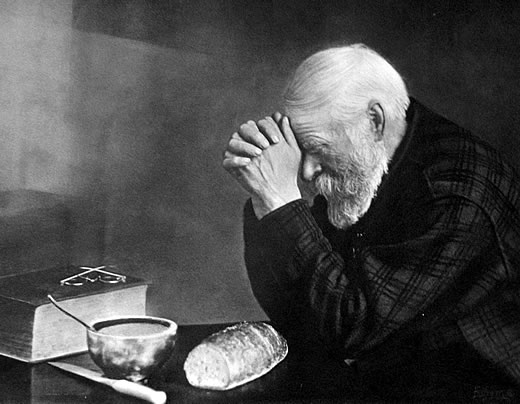The First Step in the Spiritual Life is Surprisingly Simple
Share this article, via:
Jesus said to his disciples:
“Take care not to perform righteous deeds
in order that people may see them;
otherwise, you will have no recompense from your heavenly Father.
When you give alms, do not blow a trumpet before you,
as the hypocrites do in the synagogues and in the streets
to win the praise of others.
Amen, I say to you, they have received their reward.
But when you give alms,
do not let your left hand know what your right is doing,
so that your almsgiving may be secret.
And your Father who sees in secret will repay you.“When you pray, do not be like the hypocrites,
who love to stand and pray in the synagogues and on street corners
so that others may see them.
Amen, I say to you, they have received their reward.
But when you pray, go to your inner room, close the door,
and pray to your Father in secret.
And your Father who sees in secret will repay you.“When you fast, do not look gloomy like the hypocrites.
They neglect their appearance,
so that they may appear to others to be fasting.
Amen, I say to you, they have received their reward.
But when you fast, anoint your head and wash your face,
so that you may not appear to others to be fasting,
except to your Father who is hidden.
And your Father who sees what is hidden will repay you.” Matthew 6:1-6,16-18

We might call that seeking a level two, ego-comparative advantage, the pleasure of being seen as more religious than others. And that would be your motivation to be with the Lord. But what Jesus is trying to lead his followers to is, “Don’t stay there, don’t be just about being public.” Now, he’s not saying, “Don’t go to church,” right.
Obviously, he wants us very much to be part of the public congregation, but what he wants us also to be doing, what he wants us to be practicing on a daily basis, is that ability to just want to be with the Lord. To dedicate or consecrate a half-hour, or even more, if we can do this in our lives, to take that time away to just be with him. And to want to be with him, and to know that by being with him our lives will be transformed by his grace in ways that we can’t even begin to anticipate.
And also, just to be with him because it’s desirable to be with him, and we have a sense of his holiness, and sometimes because of affective consolations, which are a gift of the Lord, we have a profound sense of his sacredness, and his holiness, and his love, and his unity, and joy that are just, they’re present with us. Something kind of invades us, and we know he’s present, and it just, being with him, being present to him. Or, with the Blessed Virgin, or with his son, and so all of these things have their intrinsic work.

But I mean, what you really want to do is pray because praying is intrinsically good. Pray because praying is just being with the Lord, and that’s good and desirable, and filled with its sacredness and love.
And sometimes when we’re praying, we don’t feel anything. And, of course, the point is we don’t have to feel anything because we know our lives are going to be transformed when we pray. When we dedicate and consecrate that time to the Lord, when we’re letting him into our lives, even if we feel nothing for day after day, for several weeks, we know our lives are being transformed. We know we’re being purified, and the same applies to fasting, and the same applies to almsgiving.
The main thing is to do it for the Lord, do it to please the Lord, do it because it is pleasing to be with the Lord, do it because it’s pleasing to be in communion with the Lord. And for no other human reason, and if we can make that transition, it’ll become quite habitual, and the reason it becomes habitual is because it’s quite addictive. It really is addictive to be around the Lord. It’s really addictive to consecrate that time to him and to the blessed mother, our blessed mother.
And when we do that, of course, at the end of the day, we will be transformed, and we will not be disappointed, but it takes faith.
Amen.
Web development by JP Creative Group


